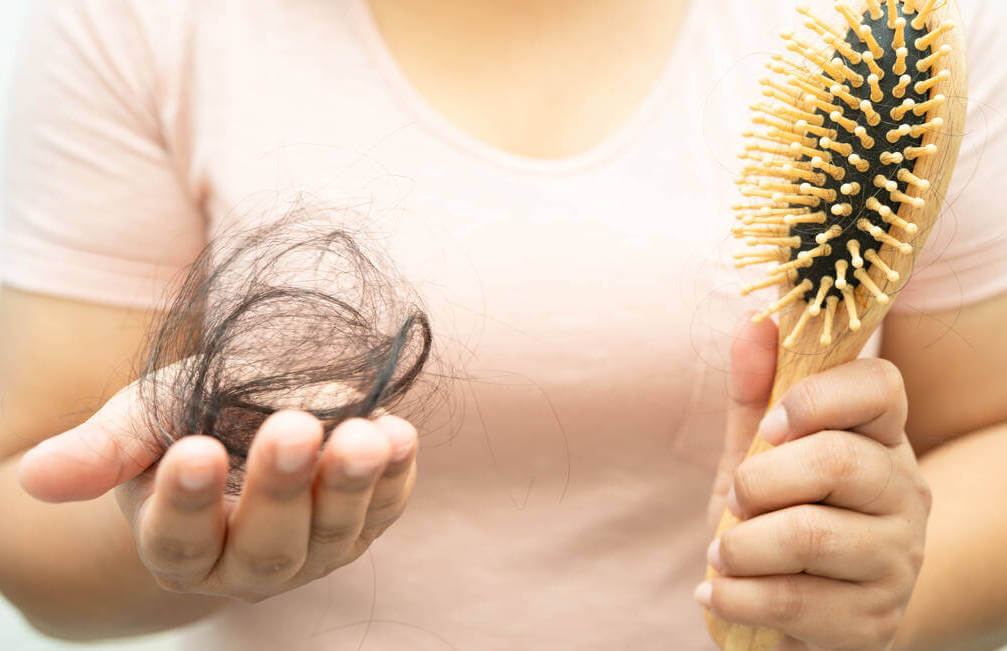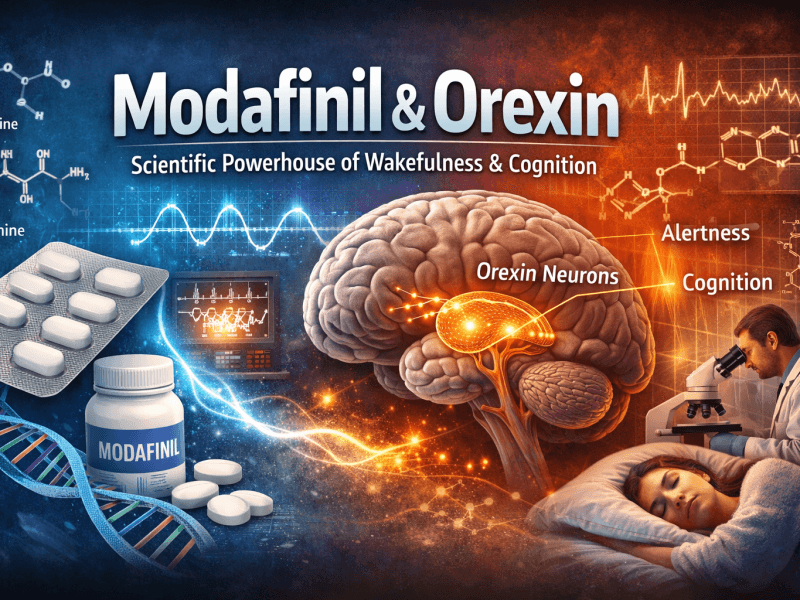Last Updated on 16/02/2026 by James Anderson
Separating Anecdote from Evidence in an Underexplored Domain
Modafinil (Provigil) has an exceptionally well-characterized safety profile for a central nervous system agent. Its common side effects headache, nausea, insomnia are documented in prescribing information and familiar to clinicians. However, in the vast ecosystem of online health communities, a recurring question demands rigorous examination: Does Modafinil cause hair loss?
This question is not trivial. Hair loss (alopecia) carries significant psychological weight, affecting self-image, confidence, and quality of life. For a medication often used off-label by populations already concerned with performance and appearance students, professionals, biohackers even a rare, unconfirmed association can generate disproportionate anxiety.
Analysis of the putative link between Modafinil and alopecia. We will:
- Critically examine the available data, from post-marketing surveillance to anecdotal reports.
- Explore the plausible biological mechanisms by which Modafinil could, in theory, influence hair cycling.
- Distinguish between correlation and causation, identifying confounding variables that may explain the observed association.
- Provide a clinical framework for assessing and managing hair loss in the context of Modafinil use.
- Offer clear, actionable guidance for patients and prescribers navigating this underexplored concern.
The bottom line upfront: The evidence linking Modafinil to hair loss is extremely weak, anecdotal, and mechanistically speculative. Hair loss is not listed as a common or rare adverse reaction in the FDA-approved prescribing information. However, the absence of evidence is not evidence of absence. A responsible clinical approach requires acknowledging patient concerns, investigating plausible alternatives, and applying rigorous differential diagnosis.
The Pharmacovigilance Data: What the Official Records Show
1. FDA Adverse Event Reporting System (FAERS)
The FAERS database is the primary repository for post-marketing adverse drug reactions. A search for “alopecia” or “hair loss” associated with Modafinil reveals a handful of reports a vanishingly small number relative to the tens of millions of prescriptions and off-label courses worldwide.
Key Interpretive Caveats:
- Underreporting: Adverse events, especially those perceived as non-serious (cosmetic hair loss), are dramatically underreported.
- Confounding: FAERS reports are uncontrolled; they cannot establish causation, only a temporal association.
- Denominator Problem: Without knowing the exact number of exposed individuals, incidence rates cannot be calculated.
Conclusion: FAERS data provide a signal, not a verdict. They indicate that some individuals have experienced hair loss while taking Modafinil. They do not prove Modafinil caused it.
2. Manufacturer’s Prescribing Information
The official FDA label for Provigil (Modafinil) does not list alopecia as an adverse reaction in any section (clinical trials, post-marketing experience). This is a critical datum. If a causal relationship were established or even strongly suspected, it would appear in the prescribing information.
Clinical Bottom Line: From a regulatory and pharmacovigilance standpoint, Modafinil is not considered a drug associated with alopecia.
The Anecdotal Landscape: Understanding User Reports
Online forums (Reddit’s r/modafinil, Longecity, Nootropics subreddits) contain scattered threads where users report “hair thinning” or “increased shedding” attributed to Modafinil.
1. Characteristics of Anecdotal Reports
| Feature | Typical Description |
|---|---|
| Onset | Often reported after months of chronic use, not acute. |
| Pattern | Diffuse thinning (telogen effluvium-like), not patchy alopecia areata. |
| Reversibility | Users frequently report regrowth after discontinuation. |
| Confounders | Rarely mentioned: diet changes, stress, sleep quality, other medications/supplements. |
2. Why Anecdotes Are Insufficient
- Confirmation Bias: Users experiencing hair loss may search for a cause and retrospectively attribute it to the most recent medication change.
- Coincidence: The background incidence of telogen effluvium (stress-related shedding) is high. Modafinil use may coincide with a stressful life period (exams, project deadlines) that independently triggers hair loss.
- No Control Group: Without a comparator population, we cannot know if the rate of hair loss in Modafinil users exceeds the baseline rate in the general population.
Clinical Principle: Anecdotes generate hypotheses; they do not test them.
Plausible Biological Mechanisms: A Theoretical Exploration
While no proven mechanism links Modafinil to alopecia, several theoretical pathways warrant examination. These are speculative and should be interpreted as such.
1. Telogen Effluvium (Stress-Induced Shedding)
Telogen effluvium is a reversible condition where physiological or emotional stress causes a large number of hair follicles to prematurely enter the telogen (resting) phase, followed by increased shedding 2-3 months later.
Could Modafinil trigger telogen effluvium?
- Indirect Pathway: Modafinil increases alertness, which may lead to reduced sleep duration if used late in the day. Chronic sleep deprivation is a physiological stressor that can trigger telogen effluvium.
- Direct Pathway (Speculative): Modafinil’s modulation of dopamine and norepinephrine could, in theory, influence the hypothalamic-pituitary-adrenal (HPA) axis, increasing cortisol. Elevated cortisol is associated with telogen effluvium.
Verdict: Plausible as an indirect mechanism via sleep disruption, but not established.
2. Nutritional Deficiencies (Appetite Suppression)
Modafinil, like many dopaminergic agents, can suppress appetite. Chronic, significant caloric restriction or specific nutrient deficiencies can impair hair growth.
| Nutrient | Role in Hair Health | Effect of Deficiency | Relevance to Modafinil |
|---|---|---|---|
| Iron | Essential for hair follicle cell proliferation. | Diffuse thinning; common in women. | Appetite suppression could reduce iron intake. |
| Zinc | Supports follicle protein synthesis. | Hair loss, poor growth. | Possible with inadequate diet. |
| Protein | Hair is primarily protein (keratin). | Brittle, thinning hair. | Low intake impairs growth. |
| Vitamin D | May play role in hair follicle cycling. | Associated with alopecia. | Deficiency common regardless of Modafinil. |
| B Vitamins | Energy metabolism; biotin critical. | Deficiency rare, but can cause thinning. | Unlikely with varied diet. |
Verdict: Modafinil users who experience significant, sustained appetite suppression and poor dietary intake could develop nutritional deficiencies that contribute to hair loss. This is an indirect effect, not a direct drug toxicity.
3. Hormonal Modulation (Dopamine-Cortisol Axis)
A speculative hypothesis: Modafinil’s mild dopaminergic enhancement could alter prolactin or cortisol dynamics. Hyperprolactinemia (elevated prolactin) is associated with hair loss in some contexts.
Evidence: There is no evidence that Modafinil reliably elevates prolactin or causes clinically significant endocrine disruption.
4. Direct Follicular Toxicity (Unlikely)
There is no plausible mechanism for direct cytotoxicity to hair follicles. Modafinil is not known to accumulate in skin or hair follicles, and its pharmacology does not suggest a pathway for direct damage.
Differential Diagnosis: Ruling Out Other Causes
Before attributing hair loss to Modafinil, a thorough investigation for more common causes is essential.
| Category | Specific Causes | Diagnostic Approach |
|---|---|---|
| Physiological Stress | Recent illness, surgery, childbirth, significant life stress. | History: Events 2-4 months prior to shedding. |
| Nutritional | Iron deficiency (especially in women), zinc deficiency, protein malnutrition. | Serum ferritin, zinc, albumin, complete blood count. |
| Endocrine | Thyroid disorders (hypo/hyperthyroidism). | TSH, free T4. |
| Androgenetic Alopecia | Genetic male/female pattern baldness. | Clinical exam; family history. |
| Telogen Effluvium (idiopathic) | Common, often no clear trigger. | Diagnosis of exclusion. |
| Other Medications | Anticoagulants, beta-blockers, retinoids, some antidepressants, NSAIDs. | Review all medications and supplements. |
| Scalp Conditions | Seborrheic dermatitis, psoriasis, fungal infection. | Dermatology referral. |
Clinical Mandate: A patient reporting hair loss while on Modafinil should undergo this basic workup before assuming causation.
Clinical Management: An Evidence-Based Approach
1. For the Patient
If you are taking Modafinil and notice increased hair shedding:
- Do Not Panic. Drug-induced telogen effluvium is almost always reversible.
- Do Not Stop Modafinil Abruptly. Abrupt cessation can cause its own set of withdrawal symptoms (rebound fatigue, hypersomnia). Consult your prescriber.
- Conduct a Self-Audit:
- Has your diet changed significantly since starting Modafinil? Are you eating enough protein, iron-rich foods?
- Are you sleeping adequately? (Remember: no dosing after 12 PM).
- Have you experienced unusual stress, illness, or life changes in the past 2-4 months?
- Schedule a Medical Appointment. See your primary care provider or a dermatologist. Bring a list of all medications, supplements, and a timeline of your hair loss relative to starting Modafinil.
2. For the Prescriber
When a patient reports alopecia possibly related to Modafinil:
- Validate the Concern. Do not dismiss it. Acknowledge that while unproven, reports exist.
- Perform a Targeted History and Exam.
- Onset, pattern, duration of hair loss.
- Dietary assessment, stress history, sleep quality.
- Review of systems (fatigue, cold intolerance, menstrual changes).
- Order Basic Labs. CBC, ferritin, TSH, vitamin D, zinc (if clinically indicated).
- Consider a Drug Holiday or Switch. If workup is negative and temporal association is strong, a 4-8 week trial off Modafinil (under supervision) can clarify causation. If hair loss reverses, the association is strengthened.
- Consider Alternatives. Armodafinil (Nuvigil) is pharmacologically similar and unlikely to differ. Non-dopaminergic options for sleep disorders (pitolisant) may be considered in refractory cases.
3. Supportive Measures (Evidence-Based)
| Intervention | Evidence | Recommendation |
|---|---|---|
| Balanced Diet | Strong for overall health. | Ensure adequate protein, iron, zinc. |
| Iron Supplementation | Effective only if deficient. | Supplement only if ferritin <30-40 ng/mL. |
| Biotin | Popular but weak evidence in non-deficient individuals. | Not harmful, but not a substitute for addressing root cause. |
| Minoxidil (Rogaine) | Effective for androgenetic alopecia; may help telogen effluvium recovery. | Can be considered, especially if underlying genetic predisposition. |
| Stress Reduction | Indirect benefit. | Mindfulness, exercise, sleep hygiene. |
Conclusion: A Rare, Unproven, but Biologically Plausible Association
After a rigorous, evidence-based review, the following conclusions are warranted:
- No Causal Link Established: There are no controlled studies demonstrating that Modafinil causes hair loss. The FDA label does not list alopecia as an adverse reaction.
- Anecdotal Signal Exists: Scattered user reports describe diffuse thinning that reverses upon discontinuation. This generates a hypothesis but does not prove causation.
- Plausible Indirect Mechanisms Exist: Appetite suppression leading to nutritional deficiencies, and sleep disruption leading to physiological stress, are the most credible pathways by which Modafinil could indirectly contribute to hair loss in susceptible individuals.
- Confounding is Likely: The background rate of telogen effluvium is high. Many Modafinil users are in high-stress, sleep-deprived populations (students, shift workers) where hair loss is already more common.
The clinical takeaway:
For the vast majority of Modafinil users, hair loss is not a concern. For the rare individual who experiences it, a systematic approach ruling out other causes, optimizing nutrition and sleep, and considering a supervised drug holiday is the appropriate, evidence-based response.
Modafinil remains a valuable, well-tolerated medication. The hair loss question, while worthy of investigation, should not deter appropriate use in patients with clear indications. It should, however, remind us that even well-characterized drugs can have rare, idiosyncratic effects that emerge only through the vigilance of patients and clinicians.
FAQ
Does Modafinil cause hair loss?
There is no definitive scientific evidence that Modafinil directly causes hair loss. Official FDA prescribing information does not list it as a side effect. However, rare anecdotal reports exist, and indirect mechanisms (appetite suppression, sleep disruption) could theoretically contribute in susceptible individuals.
I’ve been taking Modafinil for 6 months and notice more hair in my brush. Should I stop immediately?
No. Do not stop abruptly without consulting your doctor. Schedule an appointment to discuss your concerns. In the meantime, review your diet, sleep, and stress levels. It may be unrelated to the medication.
If Modafinil is the cause, is the hair loss permanent?
No. Drug-induced telogen effluvium is almost always reversible. Once the triggering factor is removed, hair typically regrows within 3-6 months.
Are there any blood tests I should get to check for other causes?
Yes. A reasonable initial workup includes: complete blood count (CBC), serum ferritin, thyroid-stimulating hormone (TSH), and vitamin D. Your doctor may recommend additional tests based on your history.
Could it be the Modafinil, or is it just stress from my job/studies?
It could be either, or both. Modafinil is often used during periods of high stress (exams, project deadlines). Stress itself is a major cause of telogen effluvium. Teasing apart the contribution of each requires careful history and, sometimes, a trial off the medication.
‼️ Disclaimer: The information provided in this article about modafinil is intended for informational purposes only and is not a substitute for professional medical consultation or recommendations. The author of the article are not responsible for any errors, omissions, or actions based on the information provided.
References:
- Ballon JS, Feifel D. A systematic review of modafinil: potential clinical uses and mechanisms of action. J Clin Psychiatry. 2006
- McClellan, K. J., & Spencer, C. M. Modafinil: A review of its pharmacology and clinical efficacy in the management of narcolepsy. CNS Drugs, 311–324. https://doi.org/10.2165/00023210-199809040-00006 . 1998.
- Willavize, S. A., Nichols, A. I., & Lee, J. Population pharmacokinetic modeling of armodafinil and its major metabolites. https://doi.org/10.1002/jcph.800 . 2016
- U.S. Food and Drug Administration. PROVIGIL. U.S. Department of Health and Human Services. https://www.accessdata.fda.gov/drugsatfda_docs/label/2015/020717s037s038lbl.pdf . 2015
- Gilleen, J., Michalopoulou, P. G., Reichenberg, A., Drake, R., Wykes, T., Lewis, S. W., & Kapur, S. Modafinil combined with cognitive training is associated with improved learning in healthy volunteers a randomised controlled trial. European Neuropsychopharmacology. 529–539. https://doi.org/10.1016/j.euroneuro.2014.01.001 . 2014
- Greenblatt, K., Adams, N. Modafinil. StatPearls Publishing. https://www.ncbi.nlm.nih.gov/books/NBK531476/ . 2025
- Oliva Ramirez A, Keenan A, Kalau O, Worthington E, Cohen L, Singh S. Prevalence and burden of multiple sclerosis-related fatigue: a systematic literature review. https://doi.org/10.1186/s12883-021-02396-1 . 2021.
- Mereu, M., Bonci, A., Newman, A. H., & Tanda, G. The neurobiology of modafinil as an enhancer of cognitive performance and a potential treatment for substance use disorders. https://doi.org/10.1007/s00213-013-3232-4 . 2013
- Ciancio A, Moretti MC, Natale A, Rodolico A, Signorelli MS, Petralia A. Personality Traits and Fatigue in Multiple Sclerosis: A Narrative Review. Journal of Clinical Medicine. https://doi.org/10.3390/jcm12134518 . 2023
- Natsch, A. What makes us smell: The biochemistry of body odour and the design of new deodorant ingredients. CHIMIA International Journal for Chemistry. https://doi.org/10.2533/chimia.2015.414 . 2015
- Hamada, K., Haruyama, S., Yamaguchi, T., Yamamoto, K., Hiromasa, K., Yoshioka, M., Nishio, D., & Nakamura, M. What determines human body odour? Experimental Dermatology. https://doi.org/10.1111/exd.12380 . 2014


